- Home
- Linda Lael Miller
Knights Page 5
Knights Read online
Page 5
A memory came to her, if something that had never happened could be called by such a name, of a clean and glistening device made for personal convenience, and she yearned for that luxury. In the meanwhile, she contented herself with the chamber pot and, after washing her hands in the basin, climbed back into bed and went through the whole rite of removing her chemise all over again.
After much tossing and turning, Gloriana finally slept, and this time her rest was untroubled. At cock’s crow she rose and dressed hastily in the chilly dawn. Her gown was simple brown wool, and she donned a cloak as well, for warmth and for the hood that would hide her hair. This was done out of deference to God, and not her husband, for it would be blasphemous to appear in church without a proper covering.
The mysterious Mariette must have been ill for, unlike everyone else in the vast household, she did not appear at mass that morning. Dane arrived soon after Gloriana did, flanked by both Edward and Gareth, and slipped into the pew beside his wife. She noted, in a sidelong look, that there was a grim set to his jaw and a certain pallor to his skin. If Kenbrook had slept at all the night before, he had not rested well.
Gloriana shifted uneasily on the pew, for plainly his lordship was not looking forward to the forthcoming conference in Elaina’s solar any more than she was.
Chapter 3
Members of the household smiled and nodded as Gloriana and Dane left the church together after morning mass. Whatever rumors might be circulating, the occupants of Hadleigh Castle were obviously pleased to see husband and wife walking side by side. No doubt they failed to notice, as Gloriana could not help doing, that Dane’s hand was pressed to the small of her back, propelling her along.
He inclined his head to those who called a greeting to him but did not speak, being intent on his business—whatever that was. They mounted an outside staircase, at the top of which was a door opening onto Elaina’s deserted solar.
Like most of the great keep, the chamber had been swept and aired and laid with herbs and fresh rushes in preparation for tomorrow’s ceremonies of knighthood. Gloriana thought fleetingly that here this was odd, since by Gareth’s own order the room was practically sacrosanct—a dusty shrine to his lost-thoughliving wife.
Something like pain moved in Dane’s face as he surveyed the place, but the interlude was as brief as the brush of a butterfly’s wing. In less than a moment, it was over and he had set Gloriana before him, his hard, swordsman’s hands resting gently on her upper arms. He started to speak and then fell silent again, plainly exasperated by his own reluctance.
“You want to speak to me about the woman,” Gloriana said. There were tremors in her heart, but somehow she managed to keep her outer countenance still. Or so she hoped.
Dane allowed his hands to slide slowly down Gloriana’s arms. Again it struck her that, while he was a strong man, capable of great violence if the tales his soldiers were telling were true, he cradled her elbows in his palms with care. He sighed.
“How easy this all seemed when I was yet far from this place,” he said.
Gloriana, aware that he neither wanted nor expected comment, offered none. She waited, gazing up at him with what her body had hidden showing vividly in her eyes. She was oddly injured by his tenderness, full of strange, fearful and bittersweet feelings, which meant, of course, that giving him up would be all the more difficult.
He led her to a bench carved with unicorns, maidens, birds, and flowers, and sat her down beside him. He held her hand, unthinkingly interweaving his fingers with hers. “I have brought Mariette from France,” Dane said, at long last, “with the thought of marrying her.”
Gloriana swallowed hard. She was not given to guile nor mummery, and the reverberations of her shattering heart had finally reached the surface. “But you are my husband,” she whispered, stricken.
Dane averted his gaze, then forced himself, visibly, to look at her again. “Gloriana,” he said softly, hoarsely, “surely you can see that ours was never a marriage of love, but a contract.”
She blinked. It was a new notion, this idea of marrying for love. When there was tender sentiment before the wedding, it was only a happy accident—no, love grew moment by moment, day by day, as a couple came to know and appreciate each other. She, Gloriana, had never been given a chance to have that, and fury filled her at the injustice of it.
“My father,” she said coolly, smoothing the skirts of her kirtle, “believed you to be a man of integrity who would honor his agreements.”
Dane flinched a little, to show he had felt the barb, and then smiled. “Do you want a husband, lovely Gloriana, who desires another?”
Gloriana pulled her fingers from his and stood, causing the mantle to fall from her hair. She did not trouble herself to replace it. “No,” she said fiercely, in a whisper that seemed to echo through the vast solar. “No, I do not.” She had turned her back on him, in a desperate effort to hide some of her turmoil, and she felt him standing close behind her.
To his credit, he did not venture to touch her. “It won’t be so bad,” Dane reassured her quietly. “There are fine convents all over England, where a woman of your gifts might pass her days pleasantly—”
Gloriana spun on him. “Convents?” she repeated, disbelieving. “You think to put me into a nunnery as if I were mad, like Elaina, or an adulteress?”
Dane stood his ground, his arms folded. He was, after all, a fighting man, Gloriana reminded herself, more content in conflict than in peace. The faintest hint of temper flashed in his glacial eyes. “You make it sound as though I would cast you into gaol. Convents are not such terrible places. Mariette herself was raised and educated in one—”
“Then let her go and spend her days weaving and praying and stitching—I, sir, shall not!”
“You are my responsibility, if not my true wife, and you will be properly looked after, whether you wish it so or not!”
An angry laugh escaped Gloriana, and she waved both arms in wild exclamation. “Your responsibility, am I? Well, I’m something more than that, as it happens—I am a flesh-and-blood woman, with a heart that beats and lungs that draw air, and I shall not be trundled off to the convent for the convenience of your conscience. I have gold, I have houses of my own, here and in London Town. I require no ’help’ from you!”
Dane closed his eyes for a moment, and Gloriana knew he was struggling to control himself. Care for him though she did, that being her private and eternal curse, she wished just then that the top of his head would blow off. “You will not live alone,” he decreed, when he spoke at long last, his voice low and even and somehow dangerous.
“I wouldn’t be alone,” Gloriana replied, with stubborn reasoning. “I should have my servants to attend me.”
“That is not the same,” Dane said carefully. “A woman cannot be left unprotected, unsupervised—”
Gloriana muttered a word she might have learned in that other life, the one she dreamed about so rarely, the one Edwenna had warned her not to speak of except in her prayers. “Widows,” she pointed out, “live in just such a situation, all over England, perhaps all over the world.”
“You are not a widow.”
“Pray, do not compound my tribulations by reminding me, good sir,” Gloriana replied sweetly, with a little curtsy, “I shall instead bear the name of harlot, a woman spurned for no other reason than the fecklessness of her husband and shuttled off to a convent the way a lazy servant might use his toe to nudge a dead mouse under the rushes of the great-room floor.”
Even in that dim light, Gloriana saw Dane go pale and then vividly red. “You would be named harlot,” he said, breathing the words in the way dragons breathed fire, “only if you persisted upon this foolish and fanciful course you would set for yourself. Fortunately, you will be spared this mistake, and taken in hand!”
For Gloriana, the interview was over. Leaving her mantle in a pool at Dane’s feet, she moved, hem and slippers rustling, over the fresh rushes toward the outside door. In its latticed lig
ht, she turned to look back at her husband. “You are without honor,” she said, in dulcet tones, “and have no honest claim to knighthood. You may go straight to hell, for all I care, and roast there on a spit.”
With those rash words, which probably endangered her own soul, Gloriana left Elaina’s solar and fled gracefully down the outer stairway.
Dane stood alone in the room where, as a green and besotted boy, he had once sat at his sister-in-law’s feet, listening as she played the harp or sang merry songs or told marvelous stories of wizardry. How he had loved those tales of hers—full of magic and mischief they’d been—and he remembered them now, not word for word, but dream for dream. He felt a compelling need to be near Elaina, though of course he knew that, in her madness, she could not lend him comfort as of old. Stories would not help him now, nor songs and harps.
He encountered Edward, who had no doubt been lying in wait, at the bottom of the courtyard stairs. The boy was peeling a pear with a thin-bladed knife, and Dane wondered, forcing back a smile, if the stripling fancied himself a fearsome figure.
“Hello, Edward,” Dane said. “I go to pay respects to the lady Elaina. Will you join me?”
Edward looked surprised, though whether it was the invitation that had caught him off guard or Dane’s patent refusal to explain his encounter with Gloriana in the solar, Dane could not guess. Nor, in point of fact, did he care.
“Elaina?” Edward echoed, as though he had yet to hear the name. “But she’s mad.”
Dane was already striding in the direction of the second bailey and the stables therein when he replied. “Perhaps,” he allowed. “Or perhaps our sister-bymarriage is merely wiser than all the rest of us.”
“But she sees things that aren’t there,” Edward scrambled to point out, taking two strides for every one of Dane’s, “and they say she hears voices.”
Dane shrugged and kept walking. “Mayhap it is we who are blind, and deaf,” he said. He spoke thoughtfully this time, wondering if those terms did not apply to him in some ways, at least where Gloriana was concerned. “In any event,” Dane went on, shaking off a sense of mild dismay, “I have no fear of the gentle Elaina.”
Within the stables, Dane found Peleus and saddled the great stallion himself, as he generally did. The beast was headstrong and had trampled more than one hapless groom in the brief time Dane had owned him. Edward, who had apparently elected to make the short ride to the abbey along with him, led a respectable gelding out into the sunlit yard. Dane recognized the worn saddle and smiled slightly.
“I would speak of Gloriana,” Edward said, as they rode slowly through the outer bailey toward the gates, which stood open despite Gareth’s alleged problems with Merrymont.
“And I would not,” Dane answered, as the hooves of their horses clattered over the ancient timbers of the drawbridge. “Soon you shall be made a knight, Edward. Let us talk of that instead.”
The road that curved beyond the empty moat was lined with oak trees, and their leaves made pleasant, moving patterns of light and shadow. Despite his dilemma, a quiet joy burned within Dane’s bosom, the knowledge that he was home.
“I will be a mercenary,” Edward said. “Like you. Perhaps I will go and fight the Turk.”
Horrific images rose before Dane’s eyes, like specters, things he had seen done by and to the muchfabled Turk, but he forced them back behind the mental walls he had erected to contain them. He’d had much practice, since he’d gone soldiering, at putting such memories aside. “It is your life,” he said simply, “to do with as you will.” He saw Gloriana’s face in his mind, wearing an ironic expression that said the same was true of her.
“Would you do it again?” Edward asked. “Leave Kenbrook Hall, I mean, and England to fight for gold?”
Leather creaked as Dane turned in the saddle to assess his young brother anew. “When I have worked out the answer to that question for myself,” he said, “I will share it with you. War is not a sport, Edward, like the scraps you have with other boys who fancy themselves knights, nor is it a game, like chess. No, it is a grim and ugly business, the making of war, and I am weary of it.”
“You are old,” Edward said, as though that fact dispensed with all else.
Dane laughed, then recalled that he had thought the same thing about Gloriana, that she would be a crone, with withered skin and bad teeth, if she had teeth at all. What a naive fool he’d been, for all his traveling and fighting, no wiser, in some ways, than Edward. “Yes,” he replied, knowing no argument would serve, in the circumstances. “I am old, and fit for nothing but lying on my belly before the fire, like an aged dog with too many hunts behind him.”
Edward was silent for a time, which was a mercy, to Dane’s mind. A soldier, a commander of men, Dane was not used to idle talk, and he did not relish it. He was beginning to hope they would gain the abbey gates without exchanging another word when the lad spoke again.
“I would court Gloriana,” he said, with a note of glumness in his youthful voice. “She is beautiful and kind, full of spirit and joy. She is quick-minded, in the bargain.”
“Does the lady return your sentiments?” Dane asked. The high abbey gates were shut, and he bent from Peleus’s gleaming ebony back to grasp the latchstring. Another sign, he thought, of either carelessness or a zealot’s belief in peace that admittance could be gained so easily.
“Gloriana believes herself to be devoted to you,” Edward answered, with a directness Dane could not fail to admire. “She will get over that, as time passes.”
Dane recalled the lady’s admonition that he go “to hell … and roast there on a spit,” and smiled sadly as he rode through the open gateway. She’d gone a long way, had the lady Gloriana, toward putting her “devotion” behind her. Why did that cause him sorrow? he wondered. Surely it was the best that could be hoped for, that Gloriana should cease caring for him and resign herself to a quiet life in the seclusion and safety of an abbey such as the one he and Edward entered now.
The abbess, Sister Margaret, swept into the small courtyard, clad, as were all the members of her order, in a plain gray kirtle and wimple. She beamed at the sight of Dane, and the motion sent wrinkles spreading gently over her face, like cracks in brittle ice.
“So,” she said, as Dane dismounted. “What we have heard is true—you have come home to Hadleigh Castle at last.”
Dane raised his eyes to the gloomy hulk in the distance. “I have indeed come home,” he answered, “but to Kenbrook Hall. I will reside there, once I have attended to a few difficult matters.”
Edward uttered a small, disdainful grunt, but offered no other comment.
“How fares the lady Elaina?” Dane asked. Sister Margaret had given him her hand, and he had squeezed it slightly, for their affection for each other was great.
Sister Margaret sighed and turned to lead the way across the crumbling stones of the courtyard. The abbey, like Kenbrook Hall, was old, with a history that reached far back into the mists of history, beyond the things that had been recorded on scrolls and pages of parchment and into the realm of legend. “She claims to have truck with the fairies,” the abbess answered, “and it’s certainly true that Lady Hadleigh seems to grow younger, while the rest of us age. I think, now and then, that her fancies are not fancies at all, that she not only knows the little people but is somehow one of them and privy to their most cherished secrets.”
“Perhaps you have attended our brother’s wife too long,” Edward observed.
Dane gave the lad a withering look over his shoulder, and Edward was suitably chagrined, though the effect would probably wear off all too soon.
Elaina sat, bathed in sunshine, in a corner of a small courtyard. Her face was raised to the light, a small smile played upon her mouth, and her eyes were closed. Her hair gleamed like burnished gold, and her kirtle, made of some gossamer fabric, moved softly in the breeze and seemed, in its own way, as alive as the grass or the birds or the fluttering green leaves of the oak trees.
She opened her eyes and gazed upon her visitors without surprise. Her countenance was placid and serene, and Dane thought, as she got up and glided toward them, If Elaina is mad, then so am I.
“Dane,” Elaina said, and stood on tiptoe to kiss his cheek. “You’ve grown since I saw you last. And there are no scars—at least, not visible ones. I suppose that is good.”
“Milady,” Dane replied, by way of greeting, and would have bowed if she had not gripped his shoulders and prevented him. She searched his face and saw the tears he would not permit to come to his eyes.
“My Dane,” she said, with affection, “you grieve for me, but you shouldn’t. I am the happiest of women.” Elaina turned briefly to Edward, who stood beside the abbess and the open gate, looking as though he would bolt. “Go, Edward,” she said. “You are uncomfortable here.” It was not a complaint, this last, but a simple statement.
The boy left the courtyard willingly, and the abbess followed, closing the metal gate behind her.
Dane embraced his sister-in-law and planted a brotherly kiss on her forehead. Her hair and clothing smelled pleasantly, as Gloriana’s did, of summer herbs and fresh air and oil smoke. “Why do you stay in this place?” he asked. “You are no more mad than any of the rest of us.”
Elaina turned away at this and hugged herself, as if struck by a chill. “This is my lot, and I am content with it, for the most part.” She lowered her lovely head briefly, bowed by some secret grief, and then rallied, turning to face him again with shining eyes. “How did you find my husband? Is he hearty?”
“Gareth is well. He misses you, as do we all.”
“Yes,” Elaina answered thoughtfully. “I suppose he does, though he has his Irish mistress, you know—the lady Annabel.”
Dane opened his mouth, but before he could utter some foolish platitude, Elaina came to him and silenced him with the light touch of her fingertips.

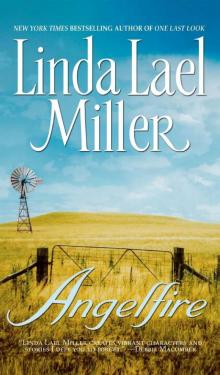 Angelfire
Angelfire Moonfire
Moonfire The Yankee Widow
The Yankee Widow The Cowboy Way
The Cowboy Way Country Strong--A Novel
Country Strong--A Novel Forever and a Day
Forever and a Day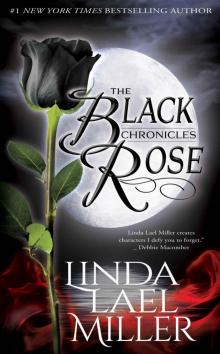 The Black Rose Chronicles
The Black Rose Chronicles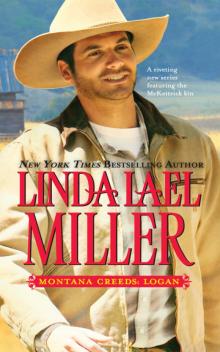 Montana Creeds: Logan
Montana Creeds: Logan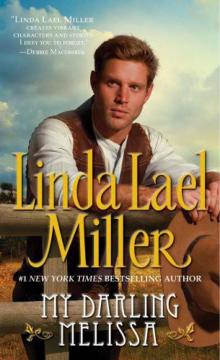 My Darling Melissa
My Darling Melissa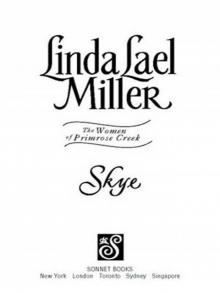 Skye
Skye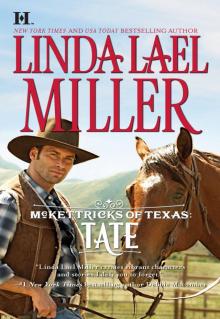 McKettricks of Texas: Tate
McKettricks of Texas: Tate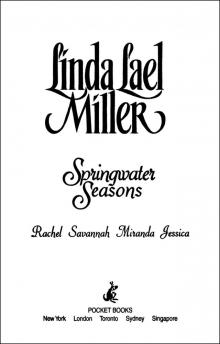 Springwater Seasons
Springwater Seasons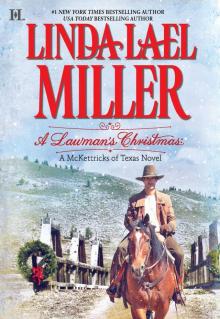 A Lawman's Christmas
A Lawman's Christmas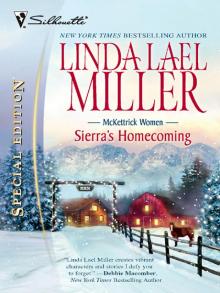 Sierra's Homecoming
Sierra's Homecoming![Parable, Montana [4] Big Sky Summer Read online](http://i1.bookreadfree.com/i/03/22/parable_montana_4_big_sky_summer_preview.jpg) Parable, Montana [4] Big Sky Summer
Parable, Montana [4] Big Sky Summer One Last Weekend
One Last Weekend A Stone Creek Collection, Volume 2
A Stone Creek Collection, Volume 2 Tonight and Always
Tonight and Always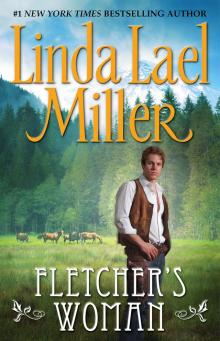 Fletcher's Woman
Fletcher's Woman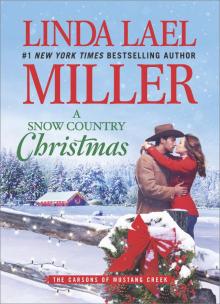 A Snow Country Christmas
A Snow Country Christmas The Last Chance Cafe
The Last Chance Cafe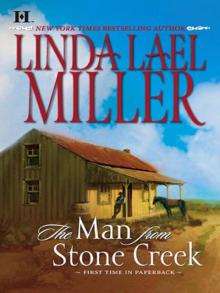 The Man from Stone Creek
The Man from Stone Creek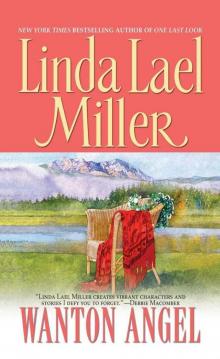 Wanton Angel
Wanton Angel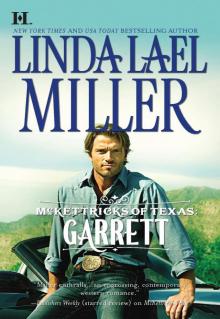 McKettricks of Texas: Garrett
McKettricks of Texas: Garrett Memory's Embrace
Memory's Embrace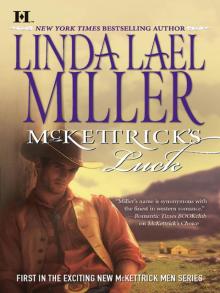 McKettrick's Luck
McKettrick's Luck Pirates
Pirates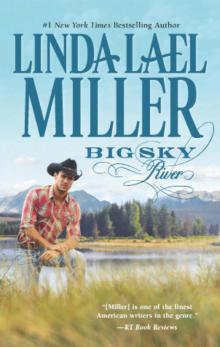 Big Sky River
Big Sky River Willow: A Novel (No Series)
Willow: A Novel (No Series)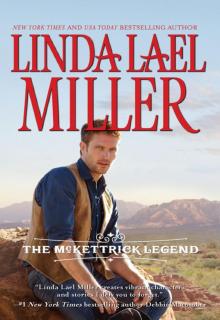 The McKettrick Legend: Sierra's HomecomingThe McKettrick Way (Hqn)
The McKettrick Legend: Sierra's HomecomingThe McKettrick Way (Hqn) Glory, Glory: Snowbound with the Bodyguard
Glory, Glory: Snowbound with the Bodyguard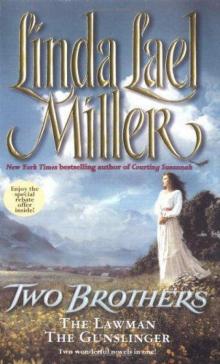 Two Brothers
Two Brothers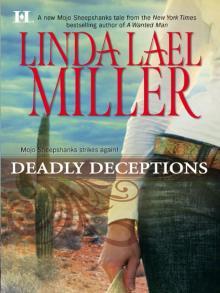 Deadly Deceptions
Deadly Deceptions Big Sky Secrets
Big Sky Secrets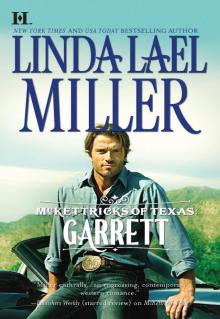 Garrett
Garrett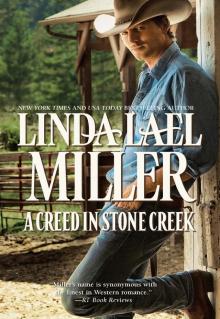 A Creed in Stone Creek
A Creed in Stone Creek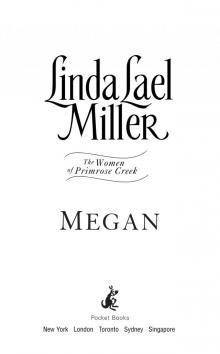 Megan
Megan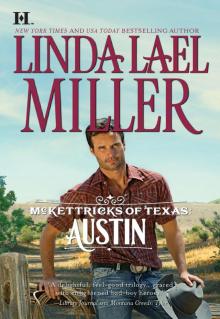 McKettricks of Texas: Austin
McKettricks of Texas: Austin Knights
Knights High Country Bride
High Country Bride More Than Words Volume 4
More Than Words Volume 4 Glory, Glory
Glory, Glory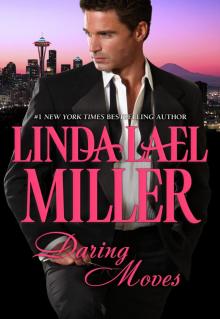 Daring Moves
Daring Moves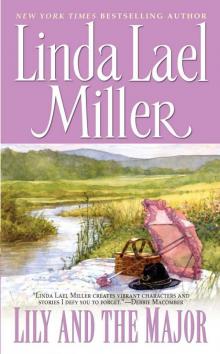 Lily and the Major
Lily and the Major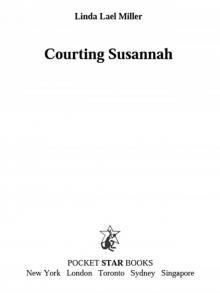 Courting Susannah
Courting Susannah Banner O'Brien
Banner O'Brien Big Sky Mountain
Big Sky Mountain Linda Lael Miller Bundle
Linda Lael Miller Bundle McKettrick's Pride
McKettrick's Pride A Stone Creek Collection Volume 1
A Stone Creek Collection Volume 1 A Wanted Man
A Wanted Man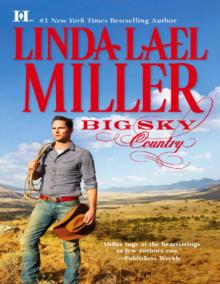 Big Sky Country
Big Sky Country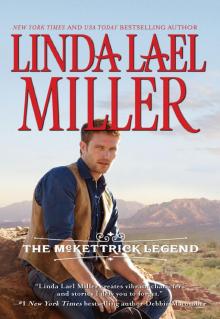 The McKettrick Legend
The McKettrick Legend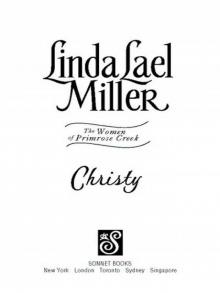 Christy
Christy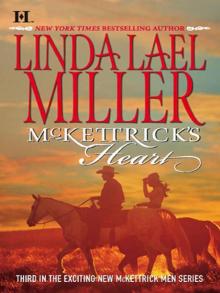 McKettrick's Heart
McKettrick's Heart Resurrection
Resurrection Arizona Heat
Arizona Heat Secondhand Bride
Secondhand Bride Snowflakes on the Sea
Snowflakes on the Sea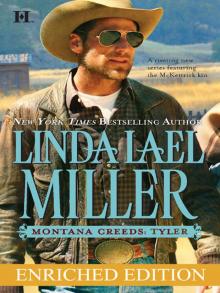 Montana Creeds: Tyler
Montana Creeds: Tyler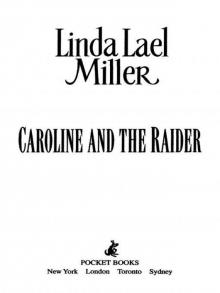 CAROLINE AND THE RAIDER
CAROLINE AND THE RAIDER A Proposal for Christmas: State SecretsThe Five Days of Christmas
A Proposal for Christmas: State SecretsThe Five Days of Christmas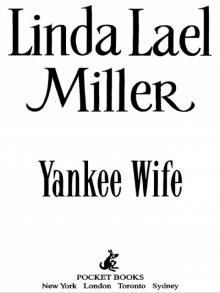 Yankee Wife
Yankee Wife Linda Lael Miller Montana Creeds Series Volume 1: Montana Creeds: LoganMontana Creeds: DylanMontana Creeds: Tyler
Linda Lael Miller Montana Creeds Series Volume 1: Montana Creeds: LoganMontana Creeds: DylanMontana Creeds: Tyler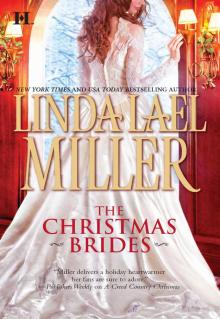 The Christmas Brides
The Christmas Brides McKettricks Bundle
McKettricks Bundle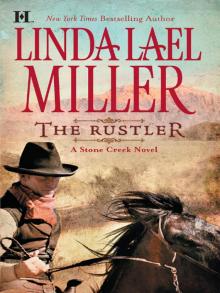 The Rustler
The Rustler Here and Then
Here and Then Only Forever
Only Forever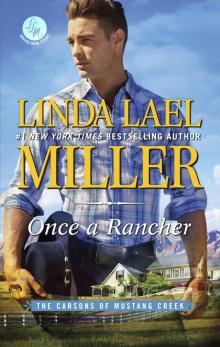 Once a Rancher
Once a Rancher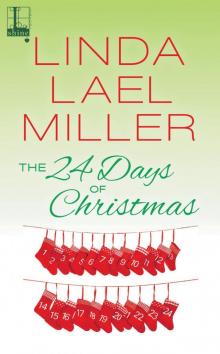 The 24 Days of Christmas
The 24 Days of Christmas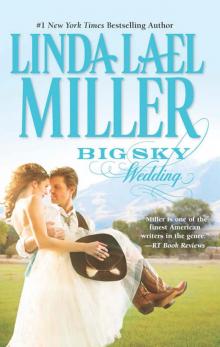 Big Sky Wedding
Big Sky Wedding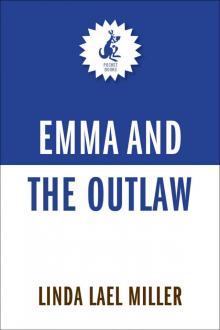 Emma and the Outlaw
Emma and the Outlaw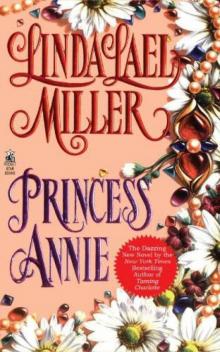 Princess Annie
Princess Annie Wild About Harry
Wild About Harry That Other Katherine
That Other Katherine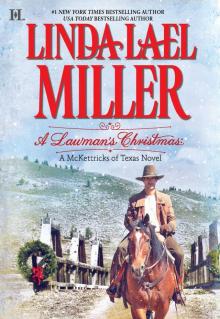 A Lawman's Christmas: A McKettricks of Texas Novel
A Lawman's Christmas: A McKettricks of Texas Novel Just Kate: His Only Wife (Bestselling Author Collection)
Just Kate: His Only Wife (Bestselling Author Collection)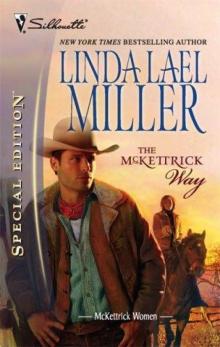 The McKettrick Way
The McKettrick Way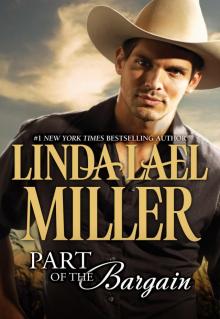 Part of the Bargain
Part of the Bargain Taming Charlotte
Taming Charlotte Holiday in Stone Creek
Holiday in Stone Creek One Last Look
One Last Look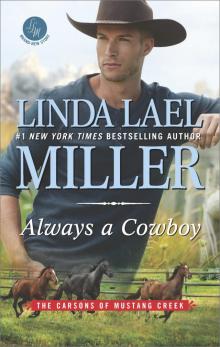 Always a Cowboy
Always a Cowboy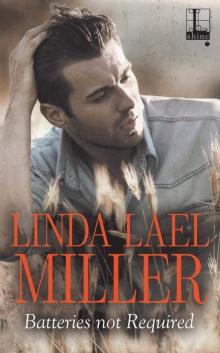 Batteries Not Required
Batteries Not Required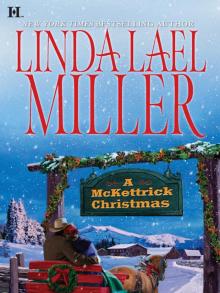 A McKettrick Christmas
A McKettrick Christmas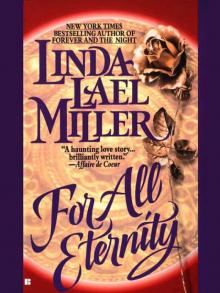 For All Eternity
For All Eternity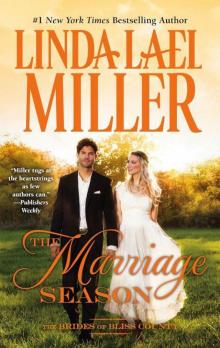 The Marriage Season
The Marriage Season Corbin's Fancy
Corbin's Fancy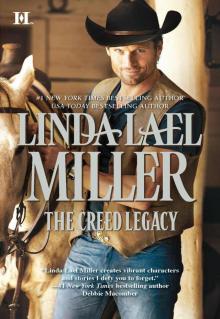 The Creed Legacy
The Creed Legacy Springwater Wedding
Springwater Wedding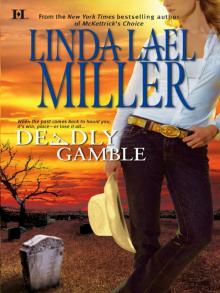 Deadly Gamble
Deadly Gamble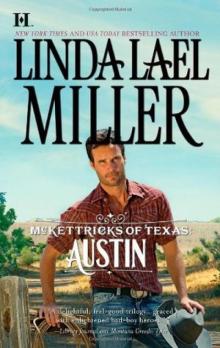 Austin
Austin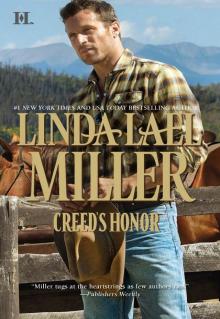 Creed's Honor
Creed's Honor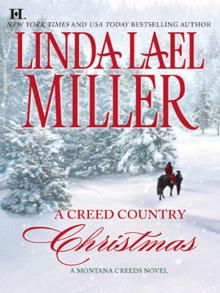 A Creed Country Christmas
A Creed Country Christmas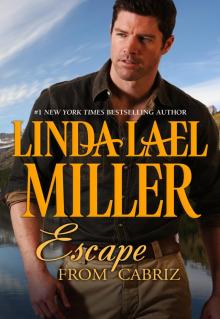 Escape from Cabriz
Escape from Cabriz There and Now
There and Now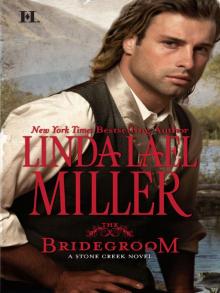 The Bridegroom
The Bridegroom State Secrets
State Secrets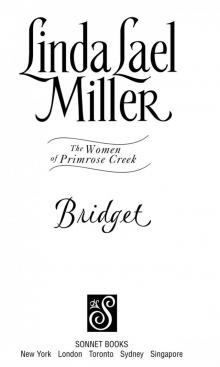 Bridget
Bridget